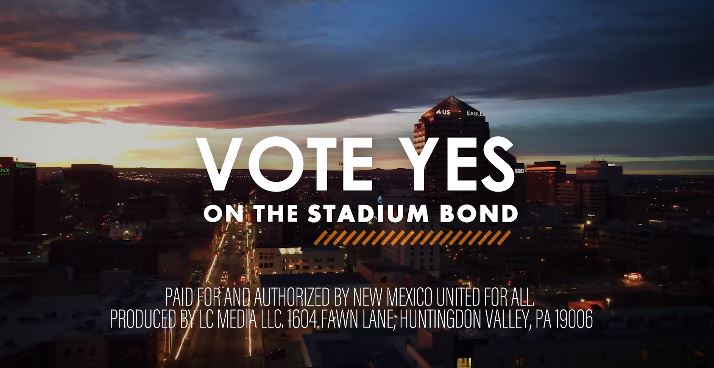By Tyler Braunhardt / NM News Port
Polls indicate the stadium bond question, set to appear on the Albuquerque ballot Nov. 2., is in danger of failing.
The stadium, if approved, would be used mainly to house Albuquerque’s Division II professional soccer team, New Mexico United, but could also serve as a venue for events — such as performances, weddings, farmer’s markets, and carnivals — and possibly as a home for a professional women’s soccer club.
Two polls, one conducted by The Paper, a one-year old weekly alternative newspaper, and one by the Albuquerque Journal, both revealed that it’ll be tough for the bond to pass.
The Paper’s poll, conducted Sept 23-24, found that 23% of likely voters said they would support the stadium, 59% were opposed and 17% were undecided.
The Journal’s poll, conducted three weeks later, Oct 15-21, found that 37% are in favor of the stadium, 55% are opposed and 7% are either undecided (4%) or say it depends (3%).
Surprisingly, our poll found that young voters do not like the proposal
— Adrian Carver, The Paper
While the findings indicate that most of those who were ‘undecided’ have since decided — and mostly in favor of the bond — the opposition to the stadium still remains well below the 50% needed for the measure to pass.
The Paper polled nearly 800 likely voters, with a margin of error of +/- 3.5% while the Journal sampled roughly 530 likely voters, with a margin of error of +/- 4.3%.
“There’s a lot of ground that proponents of a stadium need to make up in order to win on the ballot in November,” said Adrian Carver, Marketing Director at The Paper.
The Paper’s poll found that younger voters are not in favor of the stadium.
“The prevailing thought was that the team is so popular with young folks that it was going to encourage them to vote for the stadium,” said Carver. “Surprisingly, our poll found that young voters do not like the proposal.”
The Journal’s poll found the age bracket with the highest level of support were people between 35 and 49.
Both polls found that over 70% of Republicans are completely opposed to the stadium, while Democrats are split, with a slight edge to opposition.
According to The Paper’s polling data, just “30 percent of voters who say they supported Mayor Tim Keller in the 2017 mayoral election say they support the stadium. 50 percent oppose and 20 percent aren’t sure.”
With Keller’s re-election campaign in full swing, this had led him to become rather mum on the stadium, something he publicly supported up to this point, even taking to the United field this past July to say, “You all have earned a stadium… we’re going to build a new home for the United right here in the Duke City… we’re going to keep on winning for New Mexico!”
“More democrats are against the stadium, as the mayor is working to turn out more democrats to get re-elected, he is effectively turning out people that don’t support the stadium. He’s got to make sure he gets re-elected,” said Carver.
While The Paper’s poll was being conducted, New Mexico United and the City of Albuquerque announced a binding agreement that would “inject private funding into the construction of the stadium and guarantees gross receipts revenue for the city,” as Carver put it in his article detailing the polling.
The binding agreement means that while the bond will stay the same at $50 million, New Mexico United has now agreed to a $10 million commitment to help build the stadium.
Along with that commitment, the city has also signed a council resolution that will require a “community benefits agreement between the City, New Mexico United and any neighborhood directly impacted by any new soccer stadium.”
According to a City of Albuquerque news release, the resolution outlines the following requirements:
- A plan for multimodal access to be developed in collaboration with the neighborhoods surrounding the potential stadium;
- Employment and training opportunities for local residents at all levels, including youth and young adults;
- Support and identify opportunities to create more affordable and workforce housing;
- The creation of a Community Benefits Fund to be used by the neighborhoods directly impacted to build capacity and physical infrastructure to ensure the stadium promotes the neighborhood development objectives.
With election day looming, those who oppose the stadium are ramping up their efforts.
The Stop the Stadium group has been organizing rallies, outreaches, and press releases to voice their stance on the stadium.
The group has a recurring tag-line in their social media posts: “Housing first! Not a stadium!”
“This stadium will exacerbate an already dire housing crisis,” said Anna Lee DeSaulniers, one of the organizers of the Stop the Stadium group.

Meanwhile, in an attempt to drum up additional support, the pro-stadium campaign has turned to television advertisements.
In the ad, many local businesses and fans are seen applauding what the ad refers to as “The People’s Stadium,” and what it could bring to the city, citing the number of jobs it would create and how it would improve the “quality of life” for citizens.
Tyler Braunhardt is a reporter for New Mexico News Port. He can be reached on Twitter @TBraunhardt.